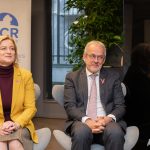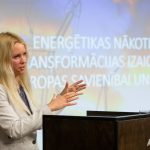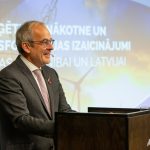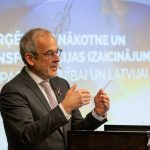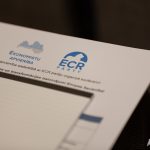Economist association together with The European Conservative and Reformist Party) developed research The Future of European energy and transformation challenges for Latvia. The research offers a comprehensive analytical base to model the most beneficial energy policy for local conditions, taking into account energy supply security, climate goals and the need to ensure a competitive energy price for households and businesses. The Future of European energy and transformation challenges for Latvia
On November 14, the Economists association organized the conference ” Future of Energy and transformation challenges for the European Union and Latvia ” which was held in Riga. The conference was organized in Latvian.
The research and conference were partly financed by the European parliament.
Opening remarks from Ojārs Kehris, The President of the Latvian Economists Association and Roberts Zīle, The Vice President of the European Parliament
Presentation of research: The Future of European energy and transformation challenges for Latvia
Panel discussion: Future of Energy and transformation challenges for the European Union and Latvia ”
Energy is the basic component of the national economy, and its health directly affects the competitiveness and sustainability of the economy both at the level of the Member States and the European Union (EU). Energy has not been a priority in the EU for a long time, so a unified policy in this area has also been lacking. In the so-called “old member states”, strong, well-equipped institutions are responsible for the energy field, and their capacity several times exceeds the capacity of the EU. In the new member states, including Latvia, energy policy is still at a rudimentary level. As a result, for example, consumers in Germany have enjoyed much lower energy prices for years than in Latvia, Lithuania, and Estonia (Germany has also rejected the EU-wide joint energy procurement). On the other hand, we now see how Germany has become enormously dependent on energy resources due to the policy implemented by Russia. Various think tanks and institutions have been suspiciously favorable to such decisions, which have ultimately benefited Russia.
Climate change, the pandemic, and, especially, Russia’s invasion of Ukraine have created a new situation in energy in particular and the economy in general. Finally, to reorient to the types of renewable energy, to stop the dependence on Russian energy resources, to diversify electriciy generation methods and supply routes – here are some of the challenges that are relevant for Latvia, the Baltic States, and the whole of Europe. Therefore, the present research is particularly important at the moment. It comes at a time when energy policy has become a priority and decision-makers need a comprehensive and, at the same time, detailed view of possible development scenarios. We thank the sponsors of the study – Balticovo, Naftimpeks, and the ECR Party – for their support, as well as the authors themselves for their work, which will make a significant contribution to the further development of the Latvian energy sector.
Ojārs Kehris, The President of the Latvian Economists Association
This study is published at a time when energy in all its manifestations has become the most discussed topic in the European and world media, as well as on political discussion platforms. From the prices of firewood and pellets to the construction of liquefied gas terminals, home heating, and solar panels on rooftops – we are talking about electriciy generation, supply and price, because these three components affect every business, every family, and every person.
In the spring of 2022, the European Commission (EC) published a plan called RePowerEU, which outlines the EU’s path to divert from Russian energy sources by 2027. Europe understands that it is necessary to revise the Green Deal guidelines and adapt them to the current geopolitical situation. During the war, the Green Deal cannot be implemented in the same timeframe as planned – before the Russian invasion of Ukraine, which means that in short term, the funds can be used for less “green” purposes to get rid of Russia’s energy resources faster.
However, in the long term, re-orientation from Russian gas and oil products will have to be balanced with sustainability and the Green Deal goals. For all of Europe, including Latvia, this creates great challenges in the energy policy – from decision- making to practical implementation. That is why I’m glad that this balanced and thorough study will allow policymakers to see both the common European direction in energy and the special potential of Latvia in it.
Roberts Zīle, The Vice President of the European Parliament











